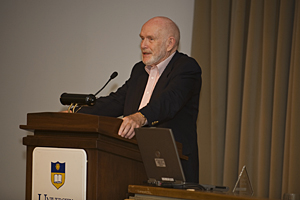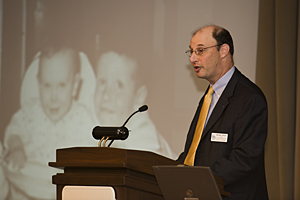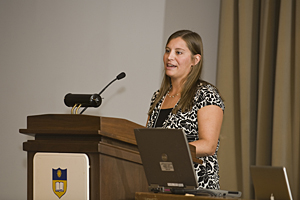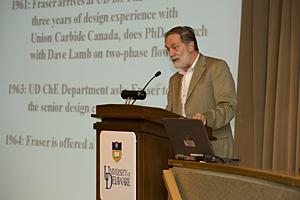

- Rozovsky wins prestigious NSF Early Career Award
- UD students meet alumni, experience 'closing bell' at NYSE
- Newark Police seek assistance in identifying suspects in robbery
- Rivlin says bipartisan budget action, stronger budget rules key to reversing debt
- Stink bugs shouldn't pose problem until late summer
- Gao to honor Placido Domingo in Washington performance
- Adopt-A-Highway project keeps Lewes road clean
- WVUD's Radiothon fundraiser runs April 1-10
- W.D. Snodgrass Symposium to honor Pulitzer winner
- New guide helps cancer patients manage symptoms
- UD in the News, March 25, 2011
- For the Record, March 25, 2011
- Public opinion expert discusses world views of U.S. in Global Agenda series
- Congressional delegation, dean laud Center for Community Research and Service program
- Center for Political Communication sets symposium on politics, entertainment
- Students work to raise funds, awareness of domestic violence
- Equestrian team wins regional championship in Western riding
- Markell, Harker stress importance of agriculture to Delaware's economy
- Carol A. Ammon MBA Case Competition winners announced
- Prof presents blood-clotting studies at Gordon Research Conference
- Sexual Assault Awareness Month events, programs announced
- Stay connected with Sea Grant, CEOE e-newsletter
- A message to UD regarding the tragedy in Japan
- More News >>
- March 31-May 14: REP stages Neil Simon's 'The Good Doctor'
- April 2: Newark plans annual 'wine and dine'
- April 5: Expert perspective on U.S. health care
- April 5: Comedian Ace Guillen to visit Scrounge
- April 6, May 4: School of Nursing sponsors research lecture series
- April 6-May 4: Confucius Institute presents Chinese Film Series on Wednesdays
- April 6: IPCC's Pachauri to discuss sustainable development in DENIN Dialogue Series
- April 7: 'WVUDstock' radiothon concert announced
- April 8: English Language Institute presents 'Arts in Translation'
- April 9: Green and Healthy Living Expo planned at The Bob
- April 9: Center for Political Communication to host Onion editor
- April 10: Alumni Easter Egg-stravaganza planned
- April 11: CDS session to focus on visual assistive technologies
- April 12: T.J. Stiles to speak at UDLA annual dinner
- April 15, 16: Annual UD push lawnmower tune-up scheduled
- April 15, 16: Master Players series presents iMusic 4, China Magpie
- April 15, 16: Delaware Symphony, UD chorus to perform Mahler work
- April 18: Former NFL Coach Bill Cowher featured in UD Speaks
- April 21-24: Sesame Street Live brings Elmo and friends to The Bob
- April 30: Save the date for Ag Day 2011 at UD
- April 30: Symposium to consider 'Frontiers at the Chemistry-Biology Interface'
- April 30-May 1: Relay for Life set at Delaware Field House
- May 4: Delaware Membrane Protein Symposium announced
- May 5: Northwestern University's Leon Keer to deliver Kerr lecture
- May 7: Women's volleyball team to host second annual Spring Fling
- Through May 3: SPPA announces speakers for 10th annual lecture series
- Through May 4: Global Agenda sees U.S. through others' eyes; World Bank president to speak
- Through May 4: 'Research on Race, Ethnicity, Culture' topic of series
- Through May 9: Black American Studies announces lecture series
- Through May 11: 'Challenges in Jewish Culture' lecture series announced
- Through May 11: Area Studies research featured in speaker series
- Through June 5: 'Andy Warhol: Behind the Camera' on view in Old College Gallery
- Through July 15: 'Bodyscapes' on view at Mechanical Hall Gallery
- More What's Happening >>
- UD calendar >>
- Middle States evaluation team on campus April 5
- Phipps named HR Liaison of the Quarter
- Senior wins iPad for participating in assessment study
- April 19: Procurement Services schedules information sessions
- UD Bookstore announces spring break hours
- HealthyU Wellness Program encourages employees to 'Step into Spring'
- April 8-29: Faculty roundtable series considers student engagement
- GRE is changing; learn more at April 15 info session
- April 30: UD Evening with Blue Rocks set for employees
- Morris Library to be open 24/7 during final exams
- More Campus FYI >>
8:14 a.m., Sept. 3, 2009----T.W. Fraser Russell, the Allan P. Colburn Professor of Chemical Engineering, was toasted and roasted at a special symposium held in honor of his retirement on Aug. 24 at Clayton Hall.
More than 200 guests arrived from as far away as Singapore and Baghdad to celebrate Russell's 45-year career as a faculty member and administrator at the University of Delaware.
In his welcoming remarks, Michael J. Chajes, dean of the College of Engineering, announced that Russell has been named the Allan P. Colburn Professor Emeritus of Chemical Engineering.
Throughout the day, nearly 50 people, ranging from family members and former classmates to students and colleagues who have worked with Russell in various capacities at the University of Delaware and beyond, stood at the podium to pay tribute to a man known for his strong intellect, devotion to teaching, and no-nonsense approach to administration.
Laughter was frequent as the audience was regaled with stories of Russell's exploits, beginning with his childhood in Saskatchewan and Alberta, Canada, and his college days at the University of Alberta in Edmonton.
Henry Glyde, professor in the UD Department of Physics and Astronomy and a native of Calgary who attended the University of Alberta at the same time as Russell, ascribed Russell's long-range vision and tenacity to his upbringing on the flat and frigid northern prairies.
“There are two seasons in Edmonton -- winter and construction,” Glyde said. “So you can see how Fraser developed his project planning ability and his obsession with timelines. When you only have three months of the year to get a project done, you have to plan ahead.”
Alan G. Sullivan, who was an undergraduate with Russell at the University of Alberta, spoke of their graduate experience at the Research Council at Alberta. Of particular interest was an early trip to collect oil sands samples from the area around Fort McMurray with Karl Clark. Clark developed the hot-water separation process that was the basis for today's thermal extraction that allows these extensive oil deposits to be commercially exploited.
After working several years in industry, Russell came to the University of Delaware as a Ph.D. student in 1961. His ability as a teacher was soon recognized, and he was hired as a part-time instructor while still a graduate student. Karl Eben, a classmate who shared an office with Russell in those days, related how Russell parlayed the appointment into a private office for himself.
Russell joined the faculty of the Department of Chemical Engineering upon completion of his degree in 1964. As Mort Denn, a former member of the chemical engineering faculty at UD and currently the Albert Einstein Professor of Chemical Engineering at City College of New York, pointed out, “This was the first and last time this has happened in the department, and Fraser has always invited us to draw our own conclusions about that.”
A number of speakers commented on Russell's advocacy of quality teaching and mentorship of students over the years. He received the University's Excellence in Teaching Award early in his career in 1968, while his most recent award was the 2009 Lifetime Achievement Award in Chemical Engineering Pedagogical Scholarship from the American Society for Engineering Education.
“Fraser's unique understanding of both engineering and pedagogy has had a great impact on many generations of students and colleagues,” said Denn, who co-authored a textbook with Russell, Introduction to Chemical Engineering Analysis, in 1972.
In 1999, Russell established the Shirley and Fraser Russell Teaching Fellowship as a memorial to his wife, who was a secondary math teacher. This fellowship supports one graduate student per year at the University of Delaware and one at the University of Alberta. Teaching fellows at UD prepare and teach several lectures in a course for one semester under the careful supervision of the faculty member. Russell attends many of the fellows' lectures, providing personal guidance and feedback.
Former teaching fellows Jennifer O'Donnell and Mary McDonald each spoke about the experience and shared messages from other fellows around the country.
“This program has had over 25 teaching fellows,” said O'Donnell, who is now an assistant professor at Iowa State University. “At least 10 of us currently hold faculty positions, so I think that speaks very well of the program. Fraser didn't scare too many of us away from the profession. Even those who have gone on to industry still talk about what a valuable experience it was.”
Russell's research contributions are also legion. Several colleagues spoke about his years of work in solar energy research and his directorship of UD's Institute for Energy Conversion (IEC).
During the 1970s, Russell's research focused on the continuous deposition of a photovoltaic semiconductor material on a moving, flexible substrate, for which he received several seminal patents. While he was director of the IEC from 1979-1995, this process was refined and taken to the pilot plant production scale using a flexible substrate. The efficiency of the photovoltaic material (copper indium gallium di-selenide), which converts sunlight into electrical energy, was improved.
Robert Birkmire, professor of materials science and current director of the IEC, noted that the institute became truly multidisciplinary under Russell's direction and in 1981 achieved the first-ever solar cell that reached 10 percent efficiency in converting solar energy to electricity.
Another IEC colleague, associate scientist Brian McCandless, said, “I came to the IEC as a physicist 30 years ago, but Fraser's mentorship made me an engineer. He constantly reminded me to think about how to 'scale up' my ideas and experiments so that they could be applied for practical use.”
In his retirement Russell will continue to serve on the board of directors of Ascent Solar Technologies, Inc., a company that is attempting to commercialize thin-film, flexible photovoltaics. If successful, such solar cells could be used to collect solar energy from many places where mounting flat solar panels is impossible.
Russell directed the IEC during a period when federal funding for solar energy research was particularly scarce. Both John Byrne, Distinguished Professor of Energy and Climate Policy and director of UD's Center for Energy and Environmental Policy, and Dan Rich, University Professor of Public Policy and former UD provost, described how a chance relocation to the IEC building on Wyoming Road while their own offices were renovated led to a productive collaboration on renewable energy policy and the creation of a joint internship between the two centers that continues today.
Another common theme among the speakers was Russell's love of the outdoors. An avid hiker, swimmer, skier, windsurfer and triathlete, Russell made the most of sabbatical opportunities in Switzerland and Hawaii.
A lifetime member of the Friends of White Clay Creek State Park, where a bridge is dedicated in his wife's memory, Russell is fond of inviting friends, students, and colleagues for hikes in the woods. At one point, a show of hands indicated that at least half of those in attendance had been on such a walk with Russell.
At the conclusion of the symposium, two UD staff members who have worked closely with Russell, Paula Newton of the IEC and Linda Huber, formerly of the Office of the Vice Provost for Research, presented him with an award recognizing his nearly 50 years of distinguished service at UD, including the following:
- Allan P. Colburn Professor of Chemical Engineering
- Director and Chief Engineer, Institute of Energy Conversion
- Vice Provost for Research
- Acting Dean of the College of Engineering
- Chair of the Department of Chemical Engineering
- Member of the National Academy of Engineering
- Engineering Excellence Award from the DuPont Company
- Francis Alison Award
- UD Excellence in Teaching Award
Then Russell had the opportunity to have the last word.
“I have a list of all the speakers,” he said, “and I will post grades by Social Security number at the back of the room.”
Thanking the organizers and speakers, Russell said, “I deeply appreciate the effort that many of you have made to travel here and participate even though many of the incidents you have described contained considerable exaggerations... Very few people are fortunate enough to hear what I heard today, and I gratefully thank all those who spoke for their efforts and their professional and personal interactions with me over the years. We have accomplished much together.”
A new academic enrichment fund has been created to commemorate Russell's career. The T.W. Fraser Russell Undergraduate Enrichment Endowment will make it possible for selected undergraduate chemical engineering students to have valuable research and internship experiences that complement classroom teaching. For more information about the fund, visit the symposium Web site or contact Armand Battisti at (302) 831-7273 or [aab@udel.edu].
Article by Beth Chajes
Photos by Kathy F. Atkinson




